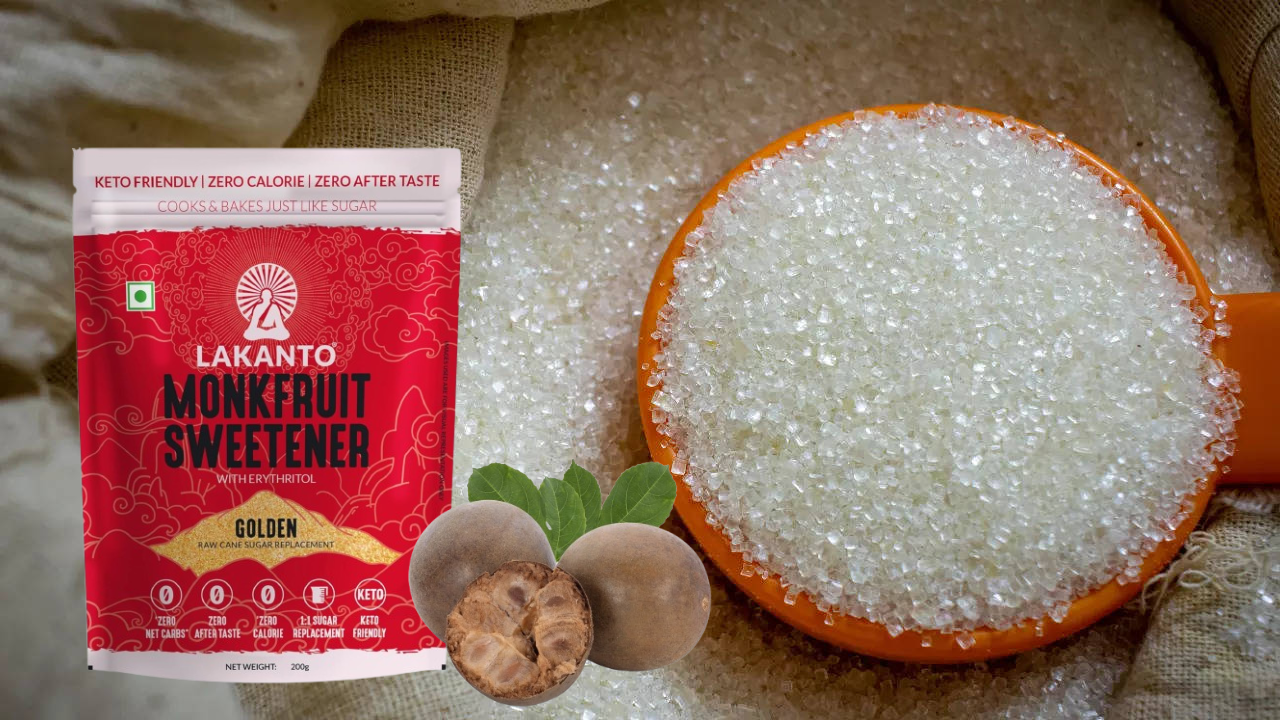Monk Fruit Sweetener: As concerns about the health risks of excessive sugar consumption grow, more people are turning to natural sugar substitutes. Among these, monk fruit has emerged as a popular choice. This small, green, melon-like fruit from southern China is known for its unique sweetness, derived from compounds called mogrosides. These mogrosides are 150-250 times sweeter than sugar, but without the calories or carbs, making monk fruit a favorite among health-conscious consumers.
A Rare Find in Markets
Monk fruit isn’t as common as other fruits like apples, oranges, or lemons, making it a unique choice. Traditionally cultivated by monks—hence the name “monk fruit”—it’s gaining visibility among diabetics and people seeking a healthier lifestyle. Though typically found as a powder or liquid sweetener rather than a fresh fruit, monk fruit offers a natural sweetness that rivals other sweeteners like stevia but without the bitter aftertaste.
A Long History in Traditional Medicine
Also called “Lo Han Guo”, monk fruit has been used in Traditional Chinese Medicine (TCM) for centuries. Known for its potential health benefits, monk fruit has been included in TCM remedies to address respiratory issues and inflammation. Its mogrosides not only deliver a sweet taste but may also offer anti-inflammatory effects, as research suggests.
Health Benefits of Monk Fruit
1. Diabetes-Friendly Sweetener
One of monk fruit’s standout qualities is that it’s considered safe for people with diabetes. Its mogrosides provide intense sweetness without affecting blood glucose levels, making it a helpful option for those managing blood sugar. However, some monk fruit products contain added sugars or fillers, so checking labels is essential.
2. Weight Management Aid
Monk fruit’s zero-calorie profile supports weight control goals, making it an excellent substitute for sugar in low-calorie diets. By replacing regular sugar with monk fruit, users can reduce calorie intake, potentially aiding in weight loss. However, moderation is key, as excessive consumption of even calorie-free sweeteners can still lead to cravings.
3. Anti-Inflammatory and Healing Properties
Research indicates that monk fruit may have anti-inflammatory properties. Hot monk fruit decoctions have been used in TCM to soothe coughs, and preliminary studies suggest mogrosides may help reduce inflammation and possibly lower cancer risks. While more research is needed, monk fruit’s medicinal benefits have long been recognized in Asia.
Is Monk Fruit Safe? Understanding FDA Approval and Long-Term Use
Monk Fruit Sweetener is classified as GRAS (Generally Recognized As Safe) by the U.S. Food and Drug Administration (FDA). While animal studies support its safety, long-term human studies, especially concerning children and pregnant women, remain limited. Experts recommend that children and pregnant women consume Monk Fruit Sweetener in moderation due to insufficient long-term data.
Combining Monk Fruit with Other Ingredients
Monk Fruit Sweetener are often mixed with erythritol, a sugar alcohol that enhances sweetness and makes it easier to use in cooking. However, erythritol can sometimes cause digestive issues, and some studies have linked its excessive intake to heart disease risks. When shopping for monk fruit sweeteners, opt for products with minimal added ingredients to ensure purity and safety.
Alternatives to Monk Fruit and How to Reduce Sugar Intake Naturally
For those looking to incorporate natural sweetness into their diets, date syrup, raisin syrup, or stevia can also be effective substitutes. These alternatives, along with natural sugars found in whole fruits, offer a healthy way to enjoy sweetness without relying on artificial sweeteners. By adding fresh fruits to yogurt, salads, and desserts, you can achieve a naturally sweet flavor without excess calories or carbs.
The Shelf Life Challenge of Fresh Monk Fruit
Fresh monk fruit has a short shelf life and tends to spoil quickly, making it challenging to find in grocery stores. Dried or powdered forms are much more practical and are widely available on e-commerce sites like Amazon. Although some people find monk fruit’s taste slightly bitter, others appreciate its more natural taste compared to synthetic sweeteners.
Is Monk Fruit Right for You?
For those looking to cut down on sugar intake, Monk Fruit Sweetener is a promising option that offers sweetness without the adverse effects of refined sugar. While it may be slightly pricier, its health benefits, particularly for weight management and diabetes support, make it a worthwhile investment for many. However, it’s essential to choose pure monk fruit products and use them in moderation, as with any sweetener.
Monk Fruit Sweetener is non-fermentable, so it does not cause gastrointestinal upset compared to other sugar alcohols like erythritol. Monk fruit is added with a sugar alcohol called erythritol to achieve a sugar-like sweetness. Erythritol is commercially made by fermenting corn and is produced in small amounts by the body, according to nutritionists. Studies have shown that high intake of this sugar alcohol can lead to heart-related problems. Therefore, experts have suggested that when buying monk fruit sweetener, it is better to buy a sweetener that does not contain erythritol and contains extracts.
Final Thoughts on Monk Fruit as a Sugar Alternative
Monk Fruit Sweetener offers a unique blend of benefits, from being safe for diabetics to aiding in weight management and reducing inflammation. Its ancient roots in Traditional Chinese Medicine and FDA recognition as a safe product add to its appeal. Though long-term studies are ongoing, Monk Fruit Sweetener represents an exciting development in the world of natural sweeteners, aligning well with current health trends focused on reducing sugar intake.
For more in-depth insights and the latest updates on world politics, health, technology, Digital Marketing and more, be sure to explore our other articles at Patriet.com. Stay informed and stay ahead with the most relevant news and expert analysis!





